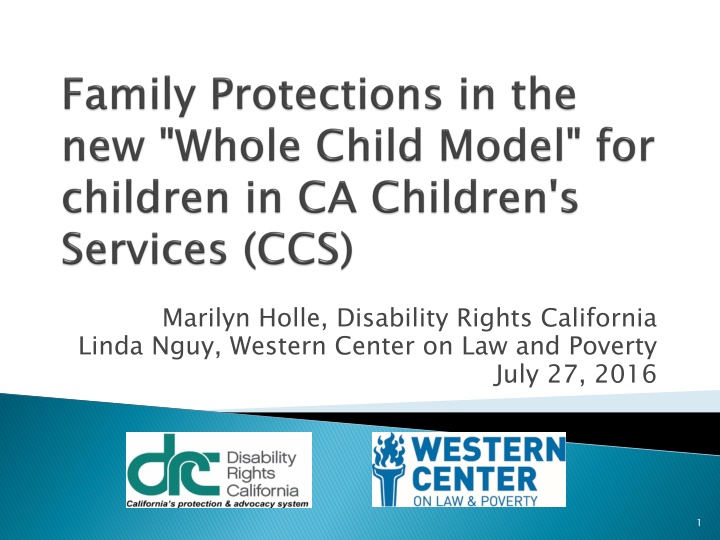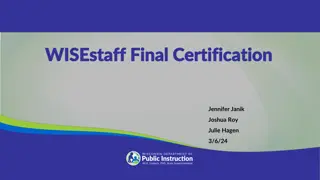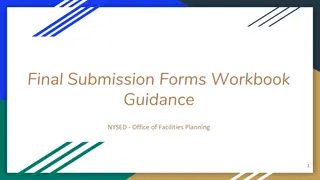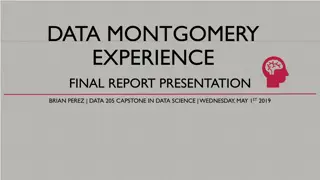
Child Healthcare Legislation and Managed Care Transition Overview
Learn about the proposed legislation (SB 586) impacting child healthcare under managed care, the Whole Child Model program, CCS services, county programs, and SB 586 by Senator Hernandez. Understand the transition process, protections, and implications for children's healthcare rights.
Download Presentation

Please find below an Image/Link to download the presentation.
The content on the website is provided AS IS for your information and personal use only. It may not be sold, licensed, or shared on other websites without obtaining consent from the author. If you encounter any issues during the download, it is possible that the publisher has removed the file from their server.
You are allowed to download the files provided on this website for personal or commercial use, subject to the condition that they are used lawfully. All files are the property of their respective owners.
The content on the website is provided AS IS for your information and personal use only. It may not be sold, licensed, or shared on other websites without obtaining consent from the author.
E N D
Presentation Transcript
Marilyn Holle, Disability Rights California Linda Nguy, Western Center on Law and Poverty July 27, 2016 1
Whole Child Model Protections under proposed legislation (SB 586) Protections under managed care Maintenance of CCS provider and quality of care standards Protecting your child s rights in the transition process Available resources 2
CCS services are currently carved out of Medi-Cal managed care in most counties and provided separately on a fee-for- service basis. The Department of Health Care Services (DHCS) proposes the Whole Child Model program to transition children in most counties with County Organized Health Systems (COHS) into Medi-Cal Managed Care beginning July 2017 but process begins in January. 3
Orange, Merced, Monterey, Santa Cruz, San Luis Obispo, Santa Barbara, San Mateo, Humboldt, Mendocino, Marin, Napa Solano Sonoma all have independent county CCS programs; other counties are dependent counties where county determines medical eligibility and may share care management responsibility with State CCS regional offices. NOTE: CCS currently carved into managed care in the following counties: Marin, Napa, San Mateo, Santa Barbara, Solano, Yolo. 4
SB 586, by Senator Hernandez is a piece of legislation that is meant to protect the service rights of children. The bill is working its way through legislature and includes important family protections including: Extend the existing CCS carve-out for the rest of the state until 2022, Stakeholder consultation; Agreement with the county CCS program or the state for CCS care coordination and service authorization Preservation of CCS program standards and provider networks, and Continuity of care protections *Changes subject to negotiations 5
Most Medi-Cal managed care plans are licensed under the Knox-Keene Act (KKA) with oversight from the Department of Managed Health Care. Being under the KKA means the plans must follow laws and regulations protecting consumer rights and access to care under both Medi-Cal and commercial plans. However, of the managed care plans under the proposed carve Mateo is KKA licensed for its enrollees. incorporated into the contract language. However, of the managed care plans under the proposed carve- -in pilot, only the Health Plan of San Mateo is KKA licensed for its Medi enrollees. Some KKA protections are in pilot, only the Health Plan of San Medi- -Cal Cal 6
Knox-Keene Act for plans for the Health Plan of San Mateo but may be applicable in other counties Boilerpoint contract language Federal Medicaid Managed Care regulations Right to services under Medi-Cal (EPSDT) and state CCS medical necessity and quality of care standards Medi-Cal and CCS appeal rights and Plan Grievances Demonstration Waiver Special Terms and Conditions Continuity of care protections Health plan oversight by the Managed Care Division of the Department of Health Care Services and by the U.S. Center for Medicare and Medicaid Services (CMS) overseeing the current 1115 Demonstration Waiver 7
Timely access. Wait times cannot exceed 10 business days for primary care appointments or mental health provider appointments, 15 business days for specialist appointments or other services to diagnose or treat a health plan. Time and distance standards. PCPs must be located within 30 minutes or 10 miles of where a beneficiary lives, but families can choose a different PCP that is farther away if desired, and in order to have a PCP knowledgeable about child s disability. Rights to services from providers with experience and clinical expertise regarding medical condition. Out of network access. Health plans must make sure beneficiaries have access to all medically necessary services, even if they cannot find them in the health plan s network and even if out of county. Member services. Health plans must have a Member Services Center to help families when they have questions. Interpreter services. Translators are available 24 hours a day, seven days a week. 8
See All Plan Letter 15-019 re general continuity of care rights Right to continue seeing your current doctor after transition to managed care for up to 12 months if have an existing relationship , defined as having seen doctor at least once during the 12 months prior to enrollment in managed care plan. Request that special care centers be added and include related imaging and laboratory work covered as diagnostic services Plan required to process request within 5 working days or three days if an emergency. Alert physician that requesting plan to authorize continued services. Plan can authorize services beyond the 12 month period, particularly if the plan does not include someone with clinical experience and expertise with your child s medical condition. 9
Your child has the right to continue the CCS services and drugs you were receiving before CCS services are put into Managed Care unless there has been a change in medical condition. This is because the Medi-Cal program is paying for your child s CCS service before and after the transfer. Under state Medi-Cal regulations, a prescription for the same medication your child had been receiving or the same OT or PT services is considered a reauthorization under 22 CCR 51003(c). If the reauthorization is denied and you request a Medi-Cal state fair hearing, you are entitled to aid paid pending. See 22 CCR 51014.1(f), 51014.2(a) and (d). This is because the denial of continued services or medication is actually a termination of services. 10
For Medi-Cal recipients under the age of 21, the applicable medical standard is the federally required Early and Periodic Screening, Diagnostic, and Treatment (EPSDT) Services required under 42 U.S.C. 1396d(r)(5): [s]uch other necessary health care, diagnostic services, treatment, and other measures to correct or ameliorate defects and physical and mental illnesses and conditions discovered by the screening services, whether or not such services or items are covered under the state plan. EPSDT requires a broader, more common sense medical necessity standard for children as opposed to the standard applicable to adults. EPSDT also requires that any medically necessary services that could be covered by Medi-Cal like private duty nursing and ABA services for autism be provided to children. See DHCS MMCD APL 14-017 regarding the obligation of managed care plans to comply with EPSDT requirements. See also the June 2014 CMS EPSDT Guide for States. 11
You can pursue both a grievance with the plan and a fair hearing at the same time. Regarding grievances, In COHS boilerplate contract, look at Attachment 14 and materials sent to you by plan. An obligation to take grievances both orally over the phone & in writing. Plan has to report quarterly on disposition of grievances. Regarding fair hearing appeals, Unclear whether will retain right to CCS appeals including the important option under 22 CCR 42140(a) which is used in some counties when the CCS agency denies authorization requested by the treating CCS physician for purposes of a binding second opinion. Right to continuation of services pending appeal under Medi-Cal if timely appeal including a denial of reauthorization. Independent Medical Review (IMR) process if the Knox Keene Act applies Problem with the appropriateness of medical examiner uses a panel with adult and Medicare experience. Insist on pediatric specialist review. 12
Federal right that your child is entitled to receive services from providers with clinical experience and expertise with your child s medical condition. Regulation authorizes disenrollment from managed care based on lack of access to providers experienced in dealing with enrollee s health care needs. 42 CFR 438(d)(2)(iv) 13
Federal Medicaid Managed Care regulations at 42 CFR 438.210(b)(3): any decision to deny a service authorization or to authorize in an amount, duration, or scope that is less than requested be made by an individual who has appropriate expertise in addressing enrollee s medical services and supports needs. Under the Knox-Keene Act an appeal of a denial of a service authorization must be decided by a clinician who is competent to evaluate the specific clinical issues mean[ing] that the reviewer has education, training, and relevant expertise that is pertinent for evaluating the specific clinical issues that serve as the basis of the contested claim. (Health & Safety Code 1370.2.) The COHS boilerplate contract makes this KKA requirement mandatory on COHS plans in grievance procedure. Exhibit A, Attachment 14, 2-G. 14
There should be no change in how wheelchairs and durable medical equipment gets authorized whether via the Medical Therapy Unit physician or the CCS paneled physician based on assessments and recommendations by occupational and physical therapists. See CCS N.L. 09- 0703 (August 8, 2003) and CCS Information Notice 05-09 (July 13, 2005). See, also, DHCS MMCD All-Plan Letter No. 15-018 about wheelchairs, seating and positioning components But correct to be concerned in light of problems adults in managed care are having in getting the wheelchairs and seating systems they need to function independently. 15
Most of those children whose CCS services will be transitioned to managed care beginning in July of 2017 are already in managed care for their other Medi-Cal services. Your child has the right to no interruption in services when transitioning from fee-for-service Medi-Cal funded CCS to Medi-Cal managed care CCS . If your child has not been using Medi-Cal managed care plan services because your child is covered by other health care so that the only Medi-Cal services your child receives is private duty nursing and/or durable medical equipment, make your child known to the Medi-Cal managed care plan member services well before the transition from CCS. 16
Well before the expected July transition check in with your child s CCS RN Case Manager. We hope the CCS RN case managers will be involved in the transition process. If your child is receiving home nursing, check in with the DHCS EPSDT case manager. Also check in with the Medi-Cal managed care plan member services. Ask if there is a specific person or persons in member services who will be helping enrollees with the CCS transition. Member services can tell you whether or not any of your current providers CCS special care centers, CCS paneled specialists, DME providers, home health agency are also providers under your Medi-Cal managed care plan. 17
While continuity of care is available for services from CCS physicians, that is not the case with the provider who fixes and adjusts your child s wheelchair or the home health agency that is staffing your child s home nursing. Ask the Medi-Cal managed care plan member services about who will be handling your child s wheelchair adjustments and repairs. Ask the plan member services whether the same or a different home health agency will be staffing your child s home nursing and equipment needs. Ask that the plan contract with your existing CCS providers so that your child s services will not be interrupted by the transition. 18
Talk to the offices of your current CCS physicians and special care center to double check whether or not they are currently a contracted provider or whether they intend to become a contracted provider with the Medi-Cal health plan. If they do not become a Medi-Cal plan provider, advise that you want to request that your child continue seeing the provider under continuity of care protections. Explain that you hope the provider will agree to that and that the payment will be the CCS rate or the plan rate if higher. If your child is also a client of a regional center, ask that the child s Individual Program Plan be amended to include the current services being received through the CCS program and that the regional center will provide case management and other services to ensure there is no interruption in services as a result of the transition. 19
Among the important EPSDT right of children with CCS eligible conditions is the right to home nursing. Children with authorized home nursing related to their CCS eligible condition have the right to continued coverage through reauthorization when their CCS services are no longer carved out of managed care. See grievances and appeals. Because the managed care plans have the obligation to ensure the delivery of nursing services even if the cost of doing so is above the fee-for-service rates, thery theoretically may provide better access to nursing services. DHCS has agreed that the Medi-Cal regulation at 22 CCR 51340(m) capping the cost of EPSDT services in the community including private nursing services to the cost of institutional care is invalid. 20
Get your childs prescriptions filled right before the transition so that you have at least 30 days or medication. If there are any repairs or adjustments needed to your child s equipment, get that taken care of before the switchover to managed care If the plan has not addressed the coverage of the child s home nursing after the transition, recommend that the CCS provider submit to the plan a service authorization for out-of-network coverage of the home nursing until there is a transition plan implemented. NOTE: Because CCS fee-for-service is Medi-Cal services, it is our position that under Medi-Cal regulations a request to the health plan for continued service is actually a reauthorization request which if denied and timely appealed, is entitled to continued service pending a fair hearing decision. 21
Your local Health Consumer Alliance organization (www.healthconsumer.org) or legal services program at 1-888-804-3536, or DRC at 1-800-776-5746. When in doubt, contact your legislator. If a regional center client, contact your Client Rights Advocate or service coordinator. The Medi-Cal managed care ombudsman for assistance at 1-888-452-8609 or MMCDOmbudsmanOffice@dhcs.ca.gov. 22
Marilyn Holle, Attorney Emerita Disability Rights California marilyn.holle@disabilityrightsca.org or (213) 213-8111 Linda Nguy, Policy Advocate Western Center on Law & Poverty lnguy@wclp.org or (916) 282-5117 23




















